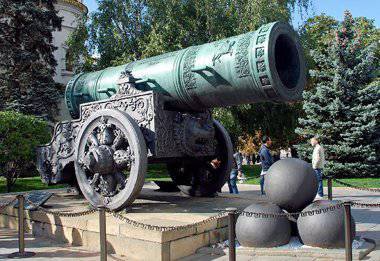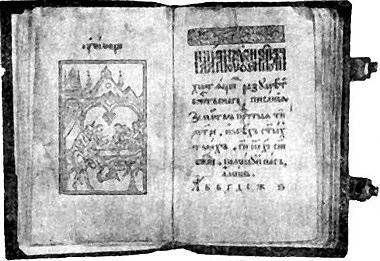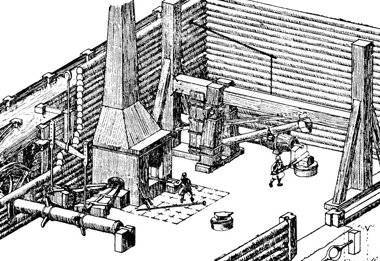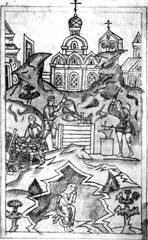Russia and the world. Country of ice and ... science
 Tsar Cannon in the Moscow Kremlin.
Tsar Cannon in the Moscow Kremlin.The natural sciences in the modern sense were born shortly before the famous Peter's "cutting through the window." Yes, universities in Europe have existed for a long time. But it is forgotten that they were trained only in scholastic theology, jurisprudence, and (not everywhere) medicine. It was taught, however, "physics", but it was part of the philosophy, and she was taught according to Aristotle. From the end of the 16th century, mathematics was introduced in Jesuit schools - although they studied it according to Euclid, other mathematicians were not yet known.
And the level of medical science can be judged by the fact that bloodletting and intestinal cleansing were recognized as generally accepted means of all diseases. King Henry II, the wounded spear in the eye and brain, was given a laxative and began to bleed. Francis II, with strong suppuration behind the ear, in addition to these means, closed the exit of pus and caused gangrene. Laxatives brought Queen Margot to death with pneumonia. Louis XIII from childhood suffered from catarrh of the stomach - he was given anemia by bleeding. And Richelieu with hemorrhoids was tortured with daily enemas.
 The second edition of the primer Vasily Burtsev.
The second edition of the primer Vasily Burtsev.But they were treated by the best doctors!
Of natural sciences, it was not by chance that astronomy was the first to develop; it became a “by-product” of the then fashionable astrology. And serious research has long remained a lot of lonely enthusiasts. What kind of scientific level can we talk about here, if at the end of the 16th century the Calvinists burned the founder of the circulatory theory Servet, in the 1616 year the Vatican banned the works of Copernicus, and Galileo was forced to renounce in the 1633 year!
And in actual fact, science began to progress only in the middle of the XVII century. And often it was in no way connected with the needs of production and with states where large-scale industry had already appeared. On the contrary, they invented in the countries of absolutism, where rich aristocrats sponsored scientists for their own entertainment. The impetus to the progress of machine technology gave ... theater. In pompous court performances it was considered chic when the stage was equipped with cunning mechanisms, clouds and chariots of “gods”, etc., drove, for which the inventors were attracted. During the construction of fountains, it suddenly became clear that water could not rise above a certain height. Where did the experiments of Torricelli and Pascal come from - and hydrodynamics was born. A side discovery of the “Torricellian emptiness”, a vacuum, for the first time denied the authority of Aristotle, who claimed that “nature does not tolerate emptiness”. The court fashion on gambling spawned an order - to calculate the probability of winning. And the theory of probability arose ... But in the struggle for the positions of professors of mathematics at Jesuit colleges, the candidates tried to prove their professionalism - and stepped over the framework of Euclid.
But even then science remained the lot of a handful of enthusiasts. British philosopher Bertrand Russell wrote that if 100 scientists had been killed in childhood in the 17th century, the modern world would not exist. They really were one. Galileo, Cardano, Tartaglia, Farm, Torricelli, Descartes, Pascal, Cavalieri, Huygens, Roberval, Desargues, Wiet ...
And they reported on the results of their research not in publications, but in correspondence among themselves - the connecting center of correspondence of all scientists of that time was monk Mersenn, on his own initiative. Only at the end of the 17th century, real scientific societies and academies appeared, the Greenwich Observatory is being built, physicians are widely involved in anatomy, Levenguk invents a microscope, Leibniz develops differential and integral calculus, Newton's genius flourishes, which in 1687 published his main work “Mathematical Principles of Natural Philosophy” . As you can see, not long before Peter went to Europe to "learn."
 General view of the molotovy barn. XVII century. Reconstruction N. B. Baklanova.
General view of the molotovy barn. XVII century. Reconstruction N. B. Baklanova.Did science exist before Peter in Russia? Yes, it did. Although, of course, also far from modern. There was its own education system. Back in 1550, the Stoglavy Cathedral pointed out the need for "literacy to learn." But usually children were taught only reading, writing, counting, Holy Scripture, and the rest of the knowledge a person had to pick up himself, in communication with "knowledgeable people" and in "extensive reading."
That is, each continued education individually, depending on the chosen profession. There was also relevant literature: for example, “Alphabet Books” - instructions for teachers with a significant amount of practical knowledge in various fields. Guldenstern in the year 1602 mentions a Russian primer. And in 1634, the Moscow Printing House published a textbook by Vasily Burtsev, "Primer of the Slavonic Language, that is, the beginning of teaching to children." Foreigners are describing in the Moscow market the Mile-long Book Series. So there was a demand for books.
However, in the XVII century, there are already permanent schools. Under Mikhail Fedorovich - for the training of clergymen, and under Alexey Mikhailovich and for secular persons - schools at the Miracle, Zaikonospassky monasteries (students were given a stipend - 10 rubles a year!), Gymnasium at the Church of St. John the Theologian in China, a school at the church St. John the Divine in Bronnaya settlement, the school at the Printing House. Finally, the Fyodor Alekseevich created the Slavic-Greek-Latin Academy.
There was its own medicine. Foscarino in the XVI century, wrote: "Doctors treat by experience and tried medicinal herbs." There was a medical literature - "Herbalists", "Zeleniki", "Medicare". There was a Pharmaceutical order, something like the "Ministry of Health." In Moscow, there was a Potion Series, which traded in medicinal herbs and other medical drugs. And there it was possible to hire "leztsa", "zubodёru", "ophthalmic", "chiropractor", "krovopuska" and even "womanish affairs of the master." Pharmaceutical order allocated drugs and medical personnel for the army, there are detailed paintings on this subject - how many “doctors”, surgeons, chiropractors. Under the tsarina, the Russian “dokhturitsa” is mentioned (and the “dokhtur” was higher than the “lechtsa”, usually the “dokhtury” were foreigners). Medical experts were among the monks of almost every monastery.
Since ancient times, there was also mathematics. And its own, subsequently repressed European. Not only the decimal system was used - they were considered to be more nines and magpies. I will not argue how convenient it is, but not at all primitive. Try to count in several systems and easily switch from one to another! (And everyone was able to count - what kind of trade without an account?)
In extant textbooks beginning of the XVI century. The terms are called “lists”, the sum is “bottom list”, the difference is “residuals”, decreasing is “borrowed list”, deductible “pay list”, the dividend is “big list”, private “zherebenny list”, the remainder is “ residual shares. There were manuals on geometry "with the application of land surveying", which provides information about the calculation of the areas of different shapes. The calculations of the squares are also contained in the work of Yermolai Erazm, "By the glorious king, the ruler and the land of agriculture".
And theoretical mathematics operated with numbers up to ... 10 in 48 degrees! - and also had its own terminology. “Darkness” in mathematics meant a thousand thousand - that is, a million, a million million - “legion”, a legion of the legions - “leodr”, and a leodr leodrov - “raven”. The unit of the 49 th digit. By the way, Old Russian mathematics in general often operated not with linear, but with power dependencies - one thousand thousand, forty forty.
There were highly educated specialists - “arithmometers”, cartographers. Of course, without foundational knowledge in the most diverse areas, such foundry workers as Andrei Chokhov, who created the Tsar Cannon, the huge Reut bell, etc., could not work. At this point, natural talent and “Russian savvy” were clearly not enough. As for the architects who solved the most complex engineering problems. And Fulvio Ruggieri, who admired the construction of our fortresses in 1568, respectfully called the Russian city planners "engineers". They knew how to make clever mechanisms. A false Dmitri sent a watch to Marina Mnishek who crafted various “pieces of Moscow custom” - they beat tambourines, played flutes and pipes. And under Mikhail Fedorovich, on the Spasskaya Tower, the Czech watch Tanner wrote that the clock was “like the Prague ones” - they called the “musical scale” on the bells.
There were enthusiastic scientists. The archive of the hegumen of the Solovki monastery of Fyodor Kolychev contains descriptions of many inventions that were introduced under his leadership. This and the giant hydraulic structures of the monastery with cunning pipelines, when the water from the 52 lakes was fed to the mills, set in motion the forges and hammers. And a mechanical dryer, a fan, and a device for warming up clay in the manufacture of bricks, and even original devices that accelerate and facilitate the manufacture of kvass.
Boyarin Matveyev studied algebra and made chemical experiments. Stolnik Godunov compiled the “Drawing of the Siberian Lands”, and Archbishop Kholmogorsky and Vazhsky Athanasius Lyubimov worked in architecture, medicine, astronomy, watched celestial bodies through “visual glass in a tree”, made maps of Pomerania and Ukraine, “Description of three ways from the Pomeranian countries to Swedish land ", developed a project for the development of the New Earth.
But we also note that Russia was by no means an industrially backward country. Back in the sixteenth century, large manufactory enterprises were salt factories - for example, the Stroganov enterprises produced 110 thousand tons of salt per year (by the way, there was its own school for training specialists, technical instructions were written). There were cable yards in Vologda and Kholmogory (Kholmogorsky provided ropes with 1/4 British fleet) And foreigners called the Moscow Cannon Yard a "foundry." He had several workshops, his own testing ground for guns, hammers were driven by hydraulic mechanisms. However, rapid industrial growth began in the XVII century - later than in Holland and England, but much earlier than in France, Italy, Spain.
 Forging a cross. Miniature Synodica XVII century.
Forging a cross. Miniature Synodica XVII century.Under Mikhail Fedorovich, another cable yard was built in Arkhangelsk, in Moscow - 2 powder mills, sewing manufactories - Tsarskaya and Tsaritsyna workshops of the chamber, weaving - Khamovnaya izba, silk - Velvet yard, Upper printing house. Their workers were “state employees”, they lived on a salary from the treasury, and Oleariy, not without surprise, reports: “In Moscow it is accepted that every month all tsarist officials and artisans receive their salaries in time; to some it is even brought to the house. ” Large enterprises were brick factories. So, the needs of Moscow provided the plant in the village. Kalitnikovo. Add a powerful tanning industry in Kazan and Murom. And in 1632, the Dutch Marcelis and Vinius received a license to build an ironworks in Tula, that is, a metallurgical plant. (By the way, the Dutch metallurgy was also developed by the Dutch). But it is noteworthy that the tsarist literacy stipulated that the owners would hire people “out of kindness and not into bondage”, “no one could take care of anyone’s cramps and offenses”.
At the time of Alexei Mikhailovich, the process went even more intensively. Often, companies that were created with the participation of foreigners, adopting their technology, were budding others, with Russian craftsmen. The Dukhaninsky glass factory was built by the Italians, and then the state-owned Izmailovsky, which produced, according to foreigners' estimates, “fairly clean glass”, arose. The paper factory on Pakhra was built by the Germans, and the government bureau was separated from it, on the Yauza River. In Moscow, the watch factory, Granatny Dvor, another 2 printing house began to operate. And the Tula factory of Marselis and Vinius brought huge profits to the owners and the treasury, and their company received permission to build new ones - they appear in Kashira, Maloyaroslavetsky counties, on Vaha, Sheksna, in Kostroma and Voronezh.
For those times, not only foreigners and merchants were engaged in high-tech production, but also the highest know. Boyar Morozov in the Moscow suburb of Pavlovsk built his own smelter using advanced equipment. Distillery, potash factories acted in his patrimonies. Miloslavsky and Odoyevsky founded their enterprises, including metallurgical ones. And it is indicative of the fact that by the year 1648 Russia supplied not only wax and honey to Europe, but also ... cannons! "Over the sea at a free price" went to 800 guns per year. They were sold to the Dutch, and they resold them to third countries - to the same France, where their own production arose through 30 years, under Colbert.
In Russia, grew like mushrooms, leather, cloth, linen manufactories. And even the king and the queen took part in it! Collins described how “beautiful houses” were built in 7 versts from Moscow for the processing of hemp and flax, “which are in great order, very extensive and will deliver work to all the poor in the state ... The Queen will manage women in this establishment benefits ”(in total, during the reign of Mikhail Fedorovich and Alexei Mikhailovich, 60“ palace ”manufactories were created). At the same time, the industrial development of the Urals began. Copper was found near Salt Kamskaya (before Russia bought it), the Pyskorsky copper smelter began to operate here. Nevyansk plants were already built, the ones that Peter would give to Demidov.
Conducted geological exploration in Siberia. The order of the Ore Investigation sent instructions to the governors to “click on the squares” about the search for minerals, for which the reward was due. Attached and instructions on how to take samples sent to Moscow, where it was concluded about the feasibility of development. As a result, iron was found in Tomsk, Kuznetsk, Yenisei, Yakutsk counties, non-ferrous metals, silver near Nerchinsk, lead on Argun, nitrate on Olekma, mica, "stone nazdak", etc. were found. Steel mills - Nitsynsky, Dolmatova monastery were built . True, in most of the fields it came only to test pits and smelting, but such authoritative researchers of Siberia as S.V. Bakhrushin and S.A. Tokarev unequivocally established: “The research of 18th century academics was based on the previous searches and experience of service people of the 17th century ".
So what was the backlog of Russia? That she invited foreign experts? But to adopt the best and latest experience is quite normal in technical progress. Suppose if there were some beautiful casters of your own - then why did Mikhail Fyodorovich not lure the famous Nuremberg master Hans Falken to Moscow (the same one on whose behalf the light gun was called the falconet)?
In fact, Peter I continued the practice of his grandfather and father. And after all, with what hunt went! Leibniz himself imposed, only frightened the king too cool social projects. A Swiss naturalist Bernoulli, going to Russia, wrote: "It is better to suffer a little from the harsh climate in the country of ices, where muses are welcomed, than to die of starvation in a country with a temperate climate, in which muses are offended and despised."
So judge for yourself what it really was - the “lag” or the wise policy of the kings, as a result of which the “brain drain” went in the opposite direction to the current one?
Information